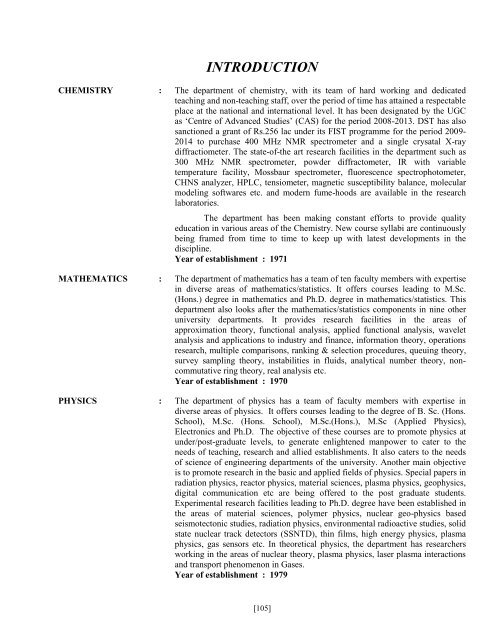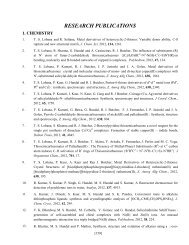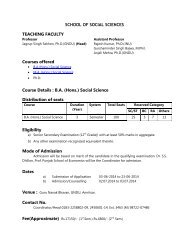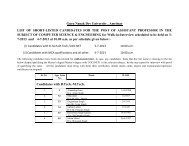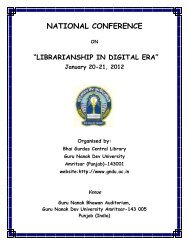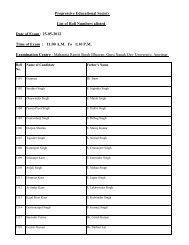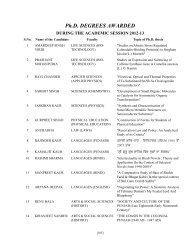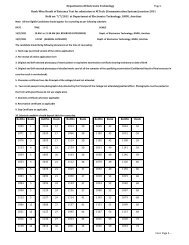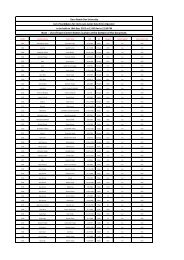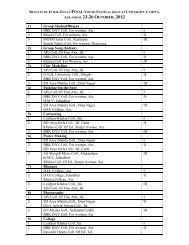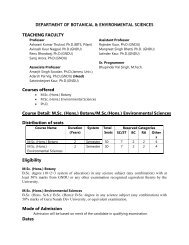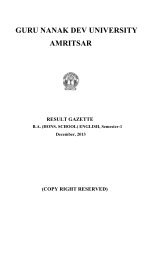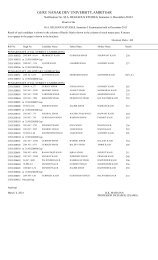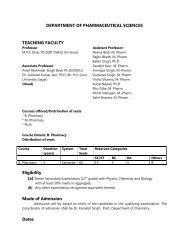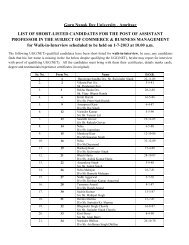Introduction - Guru Nanak Dev University, Amritsar
Introduction - Guru Nanak Dev University, Amritsar
Introduction - Guru Nanak Dev University, Amritsar
Create successful ePaper yourself
Turn your PDF publications into a flip-book with our unique Google optimized e-Paper software.
INTRODUCTION<br />
CHEMISTRY : The department of chemistry, with its team of hard working and dedicated<br />
teaching and non-teaching staff, over the period of time has attained a respectable<br />
place at the national and international level. It has been designated by the UGC<br />
as ‘Centre of Advanced Studies’ (CAS) for the period 2008-2013. DST has also<br />
sanctioned a grant of Rs.256 lac under its FIST programme for the period 2009-<br />
2014 to purchase 400 MHz NMR spectrometer and a single crysatal X-ray<br />
diffractiometer. The state-of-the art research facilities in the department such as<br />
300 MHz NMR spectrometer, powder diffractometer, IR with variable<br />
temperature facility, Mossbaur spectrometer, fluorescence spectrophotometer,<br />
CHNS analyzer, HPLC, tensiometer, magnetic susceptibility balance, molecular<br />
modeling softwares etc. and modern fume-hoods are available in the research<br />
laboratories.<br />
The department has been making constant efforts to provide quality<br />
education in various areas of the Chemistry. New course syllabi are continuously<br />
being framed from time to time to keep up with latest developments in the<br />
discipline.<br />
Year of establishment : 1971<br />
MATHEMATICS : The department of mathematics has a team of ten faculty members with expertise<br />
in diverse areas of mathematics/statistics. It offers courses leading to M.Sc.<br />
(Hons.) degree in mathematics and Ph.D. degree in mathematics/statistics. This<br />
department also looks after the mathematics/statistics components in nine other<br />
university departments. It provides research facilities in the areas of<br />
approximation theory, functional analysis, applied functional analysis, wavelet<br />
analysis and applications to industry and finance, information theory, operations<br />
research, multiple comparisons, ranking & selection procedures, queuing theory,<br />
survey sampling theory, instabilities in fluids, analytical number theory, noncommutative<br />
ring theory, real analysis etc.<br />
Year of establishment : 1970<br />
PHYSICS : The department of physics has a team of faculty members with expertise in<br />
diverse areas of physics. It offers courses leading to the degree of B. Sc. (Hons.<br />
School), M.Sc. (Hons. School), M.Sc.(Hons.), M.Sc (Applied Physics),<br />
Electronics and Ph.D. The objective of these courses are to promote physics at<br />
under/post-graduate levels, to generate enlightened manpower to cater to the<br />
needs of teaching, research and allied establishments. It also caters to the needs<br />
of science of engineering departments of the university. Another main objective<br />
is to promote research in the basic and applied fields of physics. Special papers in<br />
radiation physics, reactor physics, material sciences, plasma physics, geophysics,<br />
digital communication etc are being offered to the post graduate students.<br />
Experimental research facilities leading to Ph.D. degree have been established in<br />
the areas of material sciences, polymer physics, nuclear geo-physics based<br />
seismotectonic studies, radiation physics, environmental radioactive studies, solid<br />
state nuclear track detectors (SSNTD), thin films, high energy physics, plasma<br />
physics, gas sensors etc. In theoretical physics, the department has researchers<br />
working in the areas of nuclear theory, plasma physics, laser plasma interactions<br />
and transport phenomenon in Gases.<br />
Year of establishment : 1979<br />
[105]
APPLIED CHEMICAL : The department of applied chemical sciences and technology offers a four<br />
SCIENCES &<br />
year B. Tech. (Textile Chemistry) course (AICTE approved) and imparts training<br />
TECHNOLOGY<br />
in state-of-art technology of the textile dyeing, and printing and finishing<br />
industry. The students are taught courses related to the needs of the modern<br />
processing industry and are trained to handle most recent processes of the textile<br />
industry. The training in the department is substantiated with in-plant training in<br />
reputed textile mills of India, where afterwards they find lucrative avenues for<br />
their career. The admission is purely on the merit of the AIEEE conducted by the<br />
Government of India every year. The department has active research<br />
collaboration with various Indian as well as foreign institutes.<br />
The department also undertakes testing of raw and end products of the<br />
respective industries through the testing facilities available. The department also<br />
offers fellowships for Ph.D. degree in the fields of chemistry and technology<br />
consistent with research interests of the faculty. Recently, the department has<br />
been recognized by UGC under Special Assistance Programme (SAP) at DRS-1<br />
level.<br />
Grants received from DST, CSIR, UGC. The department has UGC<br />
(SAP) programme at DRS-1 level.<br />
Year of establishment : 1996<br />
PHARMACEUTICAL : The department offers a four-year B. Pharmacy degree course, two-year<br />
SCIENCES<br />
M. Pharm. Course and Ph.D. programme. The department is equipped with<br />
modern facilities for effective practical training of the students, which include<br />
HPLCs, FTIR, UV-VIS spectrophotometer, utlrasonicator, rotary tabletting<br />
machine, student physiograph, digital computer controlled dissolution test<br />
apparatus, deep freezer and stability test chamber.<br />
The department has ongoing research programmes in medicinal<br />
chemistry, synthetic organic chemistry, pharmaceutical formulation & product<br />
development. These programmes funded by various national agencies.<br />
Year of establishment : 1995<br />
FOOD SCIENCE : The department of food science and technology was established with the<br />
AND TECHNOLOGY objective of generating highly skilled manpower to meet the requirements of<br />
food processing industry. The M.Sc (Food Tech) programme was started in 1994<br />
and after its success was followed by B.Tech (Food Tech) programme in 1995.<br />
The department of sugar & alcohol technology has also been merged in this<br />
department on 1.4.2011. The department also offers research guidance leading to<br />
Ph.D degree. The department is well equipped with sophisticated instruments to<br />
carry out advance research in food science. Faculty members are providing<br />
consultancy & analytical services to food industry and government welfare<br />
programmes. The department has close association with well known MNC’s like<br />
Nestle India Ltd., Pepsi Foods (P) Ltd., Glaxo Smithkline Beechem Consumer<br />
Healthcare Ltd., Cadbury’s India Ltd., Joyco, Heinz, etc. Several students after<br />
completing degree from the department have got admissions in M.S Degree<br />
programs and fellowships in internationally reputed institutions.<br />
Year of establishment : 1994<br />
BOTANICAL & : The department of botanical & environmental sciences is DST- FIST sponsored<br />
ENVIRONMENTAL department. It has also received financial assistance from UGC under SAP-DRS<br />
SCIENCES<br />
programme, UGC- BSR & PURSE programmes. The department offers<br />
programmes of studies leading to the award of M. Sc. (Hons.) in Botany &<br />
[106]
Environmental Sciences, M. Phil. (Botany & Environmental Sciences) & Ph.D.<br />
The thrust areas for specialized training include environmental biology, plant<br />
physiology, statistical ecology, plant tissue culture, mutagenicity, biodiversity,<br />
ecotoxicology & vermicomposting. The course syllabi are constantly updated to<br />
keep up with the recent findings in the field of botany & environmental sciences.<br />
Seminars, conferences, field studies, workshops, project report, status reports, &<br />
research techniques constitute an integral component of teaching. The students<br />
are given sufficient exposure to use and develop computer software for use in<br />
research and teaching. The department invites scientists and experts to interact<br />
with students and deliver guest lectures. The students are involved in premier<br />
research institutes, teaching institutes, and other government sectors in India and<br />
abroad. The spirit of community participation is inculcated by organizing<br />
environmental awareness campaigns, shramdaan camps, vanmahotsav on regular<br />
basis.<br />
Year of establishment : 1990<br />
HUMAN GENETICS<br />
: The department of human genetics is a DST-FIST-sponsored, and a UGC-SAPrecognized<br />
department. Since its inception in 1990, it has grown quantitatively<br />
and qualitatively in terms of research and teaching. Various research projects<br />
have been received by the faculty members from different funding agencies such<br />
as DBT, DST, ICMR and UGC. The department has made its presence felt at the<br />
national and international levels through its research achievements. The faculty<br />
comprises a team of ten dynamic and versatile members who are well versed<br />
with the latest trends and techniques in their respective fields. The thrust areas for<br />
research are in the fields of human molecular genetics, human biochemical<br />
genetics, human cytogenetics, medical genetics, human growth and development,<br />
genetic epidemiology, genetic toxicology, and population and quantitative<br />
genetics. The students of the department have been absorbed in premier research<br />
institutes and have also been able to find employment in diagnostic centres,<br />
hospitals and teaching institutes in India and abroad.<br />
Year of establishment : 1990<br />
MICROBIOLOGY : The department offers M.Sc. (Hons) in microbiology and M.Sc. (Hons)<br />
fermentation & microbial technology. These courses are comprehensively<br />
designed to train the students theoretically and practically for fermentation and<br />
microbiology studies befitting the research institutions/industries. The<br />
department is on active interaction list with the reputed fermentation industries<br />
and top research institutes of India. The faculty is actively engaged in research<br />
and upgradation of syllabus. The students from the department have been placed<br />
in the industries, teaching and research institutions. A number of research<br />
projects from various agencies like DBT, CSIR, UGC, DST, DAE, ICMR &<br />
ICAR have been completed many more and are going on. The department has<br />
produced 45 Ph.D. students till date who have occupied good positions in<br />
teaching and research in India and abroad including USA, Canada, South Africa,<br />
Europe and Australia. Based on these achievements of the faculty and the<br />
students, the department has received grants for improvement of infrastructure<br />
under DST-FIST and UGC-SAP schemes.<br />
[107]
Year of establishment : 1990<br />
MOLECULAR : The department offers courses leading to the degrees of M.Sc., M.Phil and Ph.D.<br />
BIOLOGY<br />
in molecular biology and biochemistry. The courses are periodically updated in<br />
& BIOCHEMISTRY line with the latest scientific developments. Emphasis is laid on the basic as well<br />
as applied aspects of biochemistry and molecular biology. Research facilities are<br />
available in the fields of molecular biology of infectious and complex genetic<br />
diseases, protein biochemistry, lectins and immunology.<br />
Year of establishment : 1990<br />
BIOTECHNOLOGY : The department is imparting theoretical and practical training to the students of<br />
M.Sc. biotechnology in basic and applied aspects. The department has well<br />
equipped teaching/research and computer laboratories for imparting training to<br />
the students. The department of biotechnology admits students to the<br />
postgraduate biotechnology programme through an all India combined entrance<br />
test (AICET) conducted by Jawaharlal Nehru <strong>University</strong>, New Delhi and by the<br />
entrance examination conducted by <strong>Guru</strong> <strong>Nanak</strong> <strong>Dev</strong> <strong>University</strong>, <strong>Amritsar</strong>. This<br />
department is a constituent of national network of thirty centres imparting joboriented<br />
training to the students. The selected students in biotechnology are<br />
awarded a scholarship of Rs. 1800.00 per month throughout the two years of<br />
their study.<br />
Year of establishment : 1991<br />
ZOOLOGY : The department of zoology has a team of 6 faculty members with expertise in<br />
diverse areas of zoology. The department offers courses leading to the degrees of<br />
M. Sc. (Hons.) and Ph.D. The syllabi are updated regularly as per the UGC<br />
guidelines to keep abreast with the latest developments in the various fields of<br />
Zoology. The department maintains a museum housing a range of animal<br />
diversity and an animal house for research work. Each research laboratory is<br />
equipped with modern facilities including internet facility for the students to<br />
explore the recent developments in fields of insect physiology and biochemistry,<br />
aquatic biology, insect plant interactions, nematology, cytogenetics and solid<br />
waste management.<br />
Year of establishment : 1990<br />
COMPUTER SCIENCE :<br />
& ENGINEERING<br />
Computer science & engineering is an inter-disciplinary subject having direct<br />
applications in diverse areas. Keeping in mind the policy of the university to<br />
provide higher technical education to the people of the region and to prepare the<br />
human resource to face the upcoming technological challenge, the department of<br />
computer science & engineering (computer science & applications till 1994), was<br />
established in the year 1998. Students after completion of MCA, M.Tech &<br />
B.Tech have excellent job opportunities in software industry, management<br />
information system’s department of any industry, education and various R & D<br />
institutions in government and private sector.<br />
IT Infrastructure & Services<br />
Configuration of machines<br />
Servers 4<br />
UPS<br />
Core 2 Duo/Dual Core machines with<br />
2GB RAM and 200 + GB HDD<br />
2 x 2 KVA online UPS + 80 x 0.5 KVA<br />
UPS<br />
[108]
Student-PC Ratio 2: 1<br />
Extent of Usage–Opening and<br />
closing time<br />
9 AM to 5 PM<br />
Microprocessor Labs. 1<br />
In case of additional facilities,<br />
please elaborate<br />
Cyberoam UTM appliance with 1000<br />
user licenses.<br />
Software: List of Licensed Software available, compilers etc. : C / C++ / Java /<br />
Oracle 10 g Pro / Adobe Acrobat, Adobe Photoshop CS 3 extended<br />
Networking (LAN, WAN, Email, Internet, Dial up, Dedicated Leased lines,<br />
Bandwidth etc. ): 10 mbps leased line from Connect and 1 gbps from BSNL is<br />
available to cater to bandwidth requirements of approximately 1000 users across<br />
the campus.<br />
Year of establishment : 1988<br />
ELECTRONICS : Over the past decades, the progress in science and technology has been<br />
TECHNOLOGY<br />
phenomenal. This led to the emergence of new areas of research. Electronics<br />
and communication is one of such upcoming fields. Several institutions, research<br />
laboratories, industries from small to most sophisticated, are engaged to cover<br />
this area of education and research. Suitably trained engineers are required to<br />
continue the research in this direction. The department of electronics technology<br />
was started to cater to the requirements of developing electronics industry in the<br />
state of Punjab as well as in the rest of India.<br />
Currently, the department offers a four-year degree course in B.Tech.<br />
(electronics and communication engineering), B.Tech. (electronic<br />
communication system engineering) and M.Tech. (communication systems).<br />
Since its inception, the department has been actively involved in various research<br />
programme and with its dynamic organization and structure, will continue to do<br />
so in future.<br />
Year of establishment : 1983<br />
ARCHITECTURE : The department, established as a part of <strong>Guru</strong> Ram Das School of Planning and<br />
Architecture, was the first institute in Punjab to start the five-year integrated<br />
B.Arch. degree course. It started working independently as department of<br />
architecture in 1989 and is the oldest and premier institute in the region. Over the<br />
years, the department has evolved into a leading institution in the region by virtue<br />
of having excellent human resources as well as technical infrastructure.<br />
The department is equipped with state-of-the art laboratories such as<br />
updated computer labs - latest ARCHICAD software, arts and the graphics lab,<br />
surveying lab, building material testing lab, material museum and library. The<br />
department has an independent departmental building.<br />
The department has also leapfrogged in the areas of research and<br />
consultancy in the last few years by securing research projects and providing<br />
architectural consultancy to state government and the parent institution for<br />
various projects. The mission of the department is to develop a holistic vision of<br />
the students towards various issues of physical environment by evolving an<br />
integrated design approach incorporating the understanding of different<br />
[109]
disciplines that come together in the conceptualization of creative ideas. The<br />
department has also started two-year full time master in architecture (M.Arch.)<br />
programme in 2011 with specialization in urban design. From time to time, the<br />
syllabi and scheme of B.Arch. course is exhaustively reviewed and revised in the<br />
light of national/international architectural needs.<br />
Year of establishment : 1986<br />
GURU RAMDAS : <strong>Guru</strong> Ramdas School of Planning was established to impart education and<br />
SCHOOL OF training at post graduate level in the field of city and regional planning.<br />
PLANNING<br />
Initially, the school conducted two-year master's degree in city and regional<br />
planning (MCRP). Later on, the nomenclature of the course was changed to<br />
master of technology in urban planning (M. Tech. U.P.). At present, the school<br />
conducts three academic programmes : one at the under graduate level i.e. B.<br />
Tech. (urban and regional planning) which is of 4 years (8 semesters) and the<br />
others at the post graduate levels i.e. M. Tech. (urban planning) and master in<br />
planning (Infrastructure) which are of 2 years (4 semesters) duration. The school<br />
has emerged as one of the premier professional institution in the country for<br />
imparting education and training in the field of urban and regional planning. The<br />
school so far has trained more than 500 town planners at masters and bachelor<br />
levels. These graduates from this school are serving in different capacities in<br />
different government and private town planning and allied organisations at the<br />
national and state level in India and abroad.<br />
Year of establishment : 1972<br />
COMMERCE & : The department of commerce & business management has been making<br />
BUSINESS<br />
constant efforts to provide quality education in the areas of commerce<br />
MANAGEMENT<br />
& management. It offers master of business administration (M.B.A.), master of<br />
business administration (Hons.), financial services, master of business<br />
administration (Hons.); marketing and retail management; master of commerce<br />
(M.Com.) and Pre-Ph.D. courses in commerce and management.<br />
Year of establishment : 1984<br />
PUNJAB SCHOOL : The Punjab school of economics has been making constant efforts to provide<br />
OF ECONOMICS<br />
quality education.<br />
The UGC special assistance programme (SAP) was extended for a<br />
further period of five years (2009-2014) to carry out the research work in the<br />
identified thrust area viz. employment generation and social infrastructure in<br />
Punjab.<br />
During the year 2012, latest research and text books have been added to<br />
the departmental library and library continues to receive the various publications<br />
of the world bank in the world bank depository library. The school brought the<br />
silver jubilee issue of Indian journal of quantitative economics and published<br />
peer reviewed articles on various themes relating to current economic scenario.<br />
This journal has exchange arrangements with more than 25 national and<br />
international journals of repute.<br />
The School is equipped with modern computer lab, and other facilities<br />
both for teaching and research. The school offers the following courses:<br />
B.Sc. (Hons. School) in economics (a six semester course after +2 level)<br />
M.Sc. (Hons. School) in economics (a four semester course after<br />
graduation)<br />
[110]
Master of business economics (a four semester course after graduation)<br />
Ph.D. programme in (i) applied economic theory (ii) monetary economics<br />
(iii) international economics (iv) agricultural economics (v) industrial<br />
economics (vi) economics of development and planning (vii) regional<br />
economics (viii) public finance and (ix) environmental economics.<br />
Year of establishment : 1974<br />
HISTORY : The department offers M.A.(Hons.), M.Phil and Ph.D. It offers specialization in<br />
medieval and modern Indian history with major thrust on social, cultural,<br />
religious and economic history. The department incorporates in its syllabi the<br />
latest research work being done on the subject. It pays special attention to the<br />
study of history as a value-oriented discipline and focus on social and cultural<br />
life of the people of Punjab as its main area of research.<br />
It has produced a large number of doctoral theses and monographs<br />
related to the thrust areas.<br />
Year of establishment : 1971<br />
LIBRARY AND : The department of library & information science was set up in 1973 to cater to<br />
INFORMATION<br />
the manpower need of the libraries in this region. Initially the department<br />
SCIENCE<br />
provided programme leading to bachelor of library & information science, but<br />
since 1984-1985 it has been offering courses leading to master degrees in library<br />
and information science as well. The department also provides facilities for<br />
doctoral research. At present 10 students are enrolled/registered for Ph. D under<br />
the guidance of different teachers whereas twenty students have already earned<br />
their Ph.Ds.<br />
Special emphasis is laid on teaching of modern methods for information<br />
processing use. The department has introduced a paper, in each class, on<br />
computer and IT applications in libraries for students to work in automated<br />
libraries.<br />
The department has augmented teaching material supplied to students by<br />
adding more to the departmental library. Total number of textbooks in the<br />
departmental library has gone up to 890. A computerised catalogue of the library<br />
books has been prepared using UNESCO library software WINISIS. A computer<br />
laboratory of seven pentium-IV PCs with LAN and internet connectivity has<br />
been set up in the department for providing practical training to the students in<br />
the use of computers and networks.<br />
Year of establishment : 1973<br />
POLITICAL SCIENCE : The department of political science specializes in Indian political system, state<br />
politics with special reference to Punjab, and international politics with special<br />
emphasis upon south, south west and central asia. The Punjab Journal of<br />
Politics, bi-annual research journal of the department, is being published<br />
regularly since 1977. It carries papers mainly from three areas as stated above.<br />
The department has a programme of teaching and research guidance, leading to<br />
the award of M.A., M.Phil. and Ph.D. degrees.<br />
Year of establishment : 1972<br />
PSYCHOLOGY : The teaching programme of the department lays emphasis on fundamental and<br />
applied aspects of psychology such as experimental, cognition, motivation,<br />
[111]
developmental psychology, industrial organizational psychology, counselling &<br />
clinical psychology, statistics and research methods in psychology.<br />
The department has well equipped laboratories for experimental<br />
psychology, biofeedback, psychological testing and projective psychology. It<br />
also publishes annual Journal “Personality Study and Group Behaviour”<br />
regularly since 1981. This journal is abstracted in Indian Psychological Abstracts<br />
and indexed on the Internet for information.<br />
Year of establishment : 1970<br />
SOCIOLOGY : The department was established with a small faculty of one reader and a lecturer.<br />
The department tried to conserve its research and intellectual base and took upon<br />
itself the responsibility of publishing its own journal, <strong>Guru</strong> <strong>Nanak</strong> Journal of<br />
Sociology in 1980. The success of this ambitious step can be measured from the<br />
fact that it is being brought out without break. The journal has helped the<br />
department to establish its own academic network in the country. <strong>Amritsar</strong>, till<br />
the end of 1970s was one of the leading industrial city in the state and the major<br />
area of research, therefore, was industrial relations, trade unionism, sociology of<br />
work, organizational behaviour, management and entrepreneurship. The second<br />
stage of the development of the department was between 1986 and 1995. The<br />
faculty strength reached seven and as a result space for diverse specializations<br />
was created. Population studies, urban studies and sociology of movements were<br />
the new areas of thrust. The department is now a recognized centre for the<br />
creation of sociological knowledge. It has the distinction of organizing two<br />
conferences, namely the fifth conference of the North West Indian Sociological<br />
Association and the 27 th conference of the Indian Sociological Association and<br />
one international conference on Habitat Agenda. The faculty members visit other<br />
universities and scholars from outside also seek to interact with the faculty and<br />
students of the department. faculty members of the department have published 49<br />
books and 382 research papers.<br />
The UGC has identified the department for a grant in the area of<br />
sociology of environment in 1995. The UGC also recognized it under the special<br />
assistance programme (SAP) at DRS Level II with a grant of Rs. 62 lakhs for five<br />
years. During the past few years a shift in the thrust areas of the department has<br />
taken place. The new areas such as diaspora studies and dalit studies have been<br />
given special attention. In 2006 the department achieved distinction by getting<br />
the autonomous centre for the study of social exclusion and inclusive policy with<br />
a grant of 1.75 crores for five years.<br />
Year of establishment : 1976<br />
SCHOOL OF : School of social sciences was established to cater to the needs of outstanding<br />
SOCIAL SCIENCES students who after 10+2 plan to excel in social sciences so as to prepare them<br />
solves for competitive examinations, corporate sector and higher teaching and<br />
research. The programme offers at the undergraduate level B.A. (Honours) social<br />
sciences (a six semester course after 10+2 level) and M.A.(Hons.) social sciences<br />
(a four semester course after graduation).<br />
The courses offered by the school of social sciences are aimed for<br />
preparing the students for various competitive examinations such as IAS, IPS,<br />
PCS, and Banking etc. In recognition of the excellent performance of the<br />
bachelor in social sciences (honours school) course being run by the school of<br />
social sciences, the <strong>University</strong> Grants Commission has provided a grant of Rs.<br />
26.5 lakh for starting masters in social sciences (honours school) under its<br />
[112]
innovative and interdisciplinary emerging areas programme in 2008. Master<br />
degree course is offered in the school of social sciences is a dynamic and<br />
innovative course, aimed at equipping the students with sound theoretical<br />
knowledge about the political economy in its national as well as international<br />
settings and by giving practical experience to the students to develop the skills<br />
and insight into the fast growing emerging areas of national and international<br />
affairs.<br />
The school’s computer laboratory is equipped with INTERNET facilities<br />
and advanced research oriented software statistical package for social sciences<br />
(SPSS) which is used by teachers, research fellows and students for the purpose<br />
of research and other infrastructural facilities both for teaching and research.<br />
The School offers the following course:<br />
B.A.(Hons.) social science (a six semester course after +2 level)<br />
M.A.(Hons.) social science ( a four semester course after graduation)<br />
Year of Establishment : 2003<br />
ENGLISH : The department offers courses leading to the degrees of M.A. (Hons.) in english<br />
and M.Phil. in english. Facilities for doctoral research are also available in areas<br />
such as British and American literature, Indian literature in english and<br />
linguistics. The department also publishes a research journal Punjab Journal of<br />
English Studies annually. The department has a rich and valuable collection of<br />
books and journals in its library which caters to the need of the students and<br />
scholars pursuing research in various aspects of language and literature.<br />
Year of establishment : 1970<br />
FOREIGN : It is needless to say that foreign languages are becoming more and more<br />
LANGUAGES<br />
important in the global world of ours and our department has been playing a vital<br />
role in meeting the urgent demands of the society in this regard ever since<br />
Russian was introduced in GNDU in 1977. Since then the department has<br />
progressed by leaps and bounds and at present is offering French and German<br />
besides Russian. Facilities for research are also available in Russian.<br />
Year of establishment : 1994<br />
a fgUnh&foHkkx % fgUnh-foHkkx fo'ofo|ky; ds izkjafHkd foHkkxksa es ls gSA rqyukRed lkfgR;<br />
Hkk"kkfoKku] 'kSyh foKku ,oa dkO;'kkL=] e/;dkyhu lkfgR;] vk/kqfud lkfgR;]<br />
xq#eq[kh fyfi es a fgUnh lkfgR;] lkfgR; dk lekt'kkL=] tulapkj ,oa<br />
i=dkfjrk] vuqokn] i;kZoj.k lkfgR; vkfn dbZ fo"k;ks dk iBu ikBu foHkkx<br />
dh eq[; fo'ks"krk gSA ikB~;Øeksa dk vR;k/kqfud lkfgfR;d #>kuksa ds vuqlkj<br />
fujarj uohuhdj.k fd;k tkrk gSA yxHkx lHkh lkfgfR;d {ks=ksa ds ;ksX;<br />
'kks/k&funs'kd ,oa fo'ks"kK foHkkx es a mifLFkr gSA<br />
py jgh ifj;kstuk,a<br />
1. vk/kqfud fgUnh lkfgR; es a i;kZoj.k laca/kh psruk<br />
2. vk/kqfud Hkkjrh; vk;ZHkk"kkvksa ds lanHkZ esa fgUnh<br />
vkSj iatkch Hkk"kk dk rqyukRed v/;;u (iatkc ds fo'ks"k<br />
lanHkZ eas)<br />
[113]
3. fgUnh vkSj iatkc ds fgUnh miU;kldkjksa ds p;fur miU;klksa dk<br />
lkaLd`frd v/;;u(eqgkojksa vkSj yksdksfDr;ksa ds<br />
lanHkZ eas)<br />
LFkkiuk o"kZ % 1969<br />
gzikph nfXnB ;e{b<br />
L ;z;ko gZXo T[s/ ftef;s j' ojh seBkb'ih B/ gdkoEe, nkofEe, okiBhse, ;wkie<br />
ihtB d/ Bkb bfbs ebktK T[go th v{zxk gqGkt gkfJnk, fi; d/ f;ZN/ ti'_ nkw<br />
nkdwh, ;kfjs, ebktK s/ ;wki-;fGnkuko n;o nzdk} j'J/ jB. fJBQK gq;fEshnK<br />
ftu gzikph nfXnB ;e{b, gzikph GkFk, ;kfjs, ;fGnkuko ns/ b'eXkok d/ nfXnB,<br />
nfXnkgB ns/ y'i ~ ;wofgs j. fJ; ;e{b d/ ;ko/ e'o; ns/ T[bhe/ rJ/ ;ko/<br />
g'qrokw nzso-nB[Fk;Bh gj[zu s/ ;wekbh fuzsB d/ bykfJe jB. fJj ;e{b<br />
nfXnkgB ns/ y'i d/ y/so ftu nkgD/ ftF/F ufoZso eoe/ okFNoh wjZst dk<br />
bykfJe j. gzikph nfXnB ;e{b, i[bkJh 1979 ftu ;Ekgs j'fJnk. T[; ;w/I s'I jh<br />
fJj ;kfjs, b'eXkok, GkFk, gkfe;skBh gzikph ;kfjs ns/ gotk;h gzikph ;kfjs d/<br />
y/soK ftu f;XKse ns/ ftjkoe gZXo* *s/ nfXnkgB ns/ f;Zfynk dk ekoi eodk nk<br />
fojk j. fJjBK y/soK bJh ftGkr ftu T[u/oh y'i bJh ;j{bsK T[gbZpX jB. y'i<br />
ekoi ftu tX/o/ pb nzso-nB[Fk;Bh gj[zu-ftXh T[go j[zdk j. y'i bJh nkX[fBe<br />
seBheK ns/ ftfrnkBe ;zdK dh ;j{bs w"i{d j. ftfdnkoEhnK ns/ y'ihnK bJh<br />
ftGkr e'b fJzNoBZN ;j{bs ;fjs fJe ftef;s ezfgT{No bp dh th ;[ftXk gqkgs<br />
j. T[od{ d/ nfXnkgB s'I fJbktk ezfgT{No ngbhe/FB ~ th g';N roi{J/N e'o;K<br />
dk fjZ;k pDkfJnk frnk j.<br />
gzikph nfXnB ;e{b e'b 39 :{HihH;hH fo;ou \b', 1 g';N vkeNo'o/N \b'<br />
ns/ 6 okiht rKXh BFBb \b', 5 w"bkBk nk}kd cb'fFg Bkb ;zpzfXs \b'<br />
jB. ftGkr ftu'I jo ;kb n";sB 7 ftfdnkoEh gzikph ftu :{HihH;hH$B`N gk;<br />
eod/ jB. fJj frDsh gzikph nfXnB s/ y'i Bkb i[VhnK ;kohnK<br />
:{Bhtof;NhnK Bkb'_ tX/o/ j.<br />
:{Bhtof;Nh nk\ ne;hb_; dh roKN nXhB 3 gq'ieN cb' jB.<br />
ftGkr d/ ftfdnkoEh f;Zfynk, whvhnk ns/ f;tb ;/tktK nkfd ftu wkD:'r<br />
gdthnK *s/ ;[F'fGs jB.<br />
jo/e nekdfwe ;FB d"okB okFNoh, nzso-okFNoh, ;whBkoK$ekB\oz;K ns/<br />
toeFkgK dk nk:'iB ehsk iKdk j. ftfdnkoEhnK bJh ;fGnkukoe ns/<br />
ftfdne N{oK dk gqpzX th ehsk iKdk j. T[`u-e'Nh d/ ftdtkBK d/ jo ;kb<br />
beuo th eotkJ/ iKd/ jB. Gkos ns/ pkjo'II nkT[D tkb/ p[ZXhihthnK ns/<br />
b/yeK Bkb ftfdnkoEhnK dk w/b-i'b ns/ ;ztkdh nzso fefonk ;e{b dh fJe<br />
j'o ]k;hns j.<br />
ftfdnkoEhnK d/ p"fXe ns/ ;opgZyh ftek; bJh ftGkrh bkfJp/qoh ftu 20<br />
j}ko d/ brgr g[;seK jB. fJ; s'I fJbktk w[Zy bkfJp/qoh ftu gzikph ;kfjs,<br />
GkFk, b'eXkok s/ ;fGnkuko Bkb ;zpzfXs 90 j}ko s'I T[go g[;seK w"i{d jB.<br />
d[obZG g[;seK ns/ jtkbk ;wZroh dk fJe tZyok ;eFB j.<br />
gotk;h gzikphnK d/ ;wki ;fGnkukoe ;o'ekoK d/ nfXnB bJh :{Bhtof;Nh<br />
tZb'I 2002 ftu gotk;h nfXnB e/Ido dh ;EkgBk ehsh rJh j ns/ fJ; ;_No<br />
~ 12 bZy o[gJ/ dh roKN th :{HihH;hH tZb'I fdZsh rJh ;h.<br />
:{HihH;hH tZb'I gzikph nfXnB ;e{b ~ 2004-2009 bJh ;g d/ nzsors 45 bZy<br />
o[gJ/ dh ftF/F roKN gqkgs j'Jh j.<br />
[114]
:{Bhtof;Nh rqKN; efwFB B/ ftGkr t`b'_ y'i, nfXnB s/ nfXnkgB d/ y/so<br />
ftu ehs/ fwnkoh s/ jtkbk e/_fdqs ftF/F ezw ~ wkBsk d/_d/ j'J/ SAP-DRS-II<br />
d/ nzsors 45 bZy o[gJ/ dh j'o roKN 2010-2014 bJh ikoh eo fdZsh j.<br />
gzikph nfXnB ;e{b fty/ phHJ/H(nkBo}), n`wHJ/H(nkBo}), n`wHJ/H, n`wHfcbH d/<br />
e'o;K s'_ fJbktk gqh-ghn`uHvhH e'o; dk nfXnkgB pj[s ;\bsk g{ote ub<br />
fojk j.<br />
gzikph nfXnB ;e{b, ~ GkFktK d/ nfXnB-nfXnkgB dh w{bG{s ;zouBk ftu<br />
nekdfwe gZXo *s/ f;\sh spdhbhnK eoB ns/ s[bBkswe y'i dk fJe BtK<br />
YKuk T[;koB bJh :{HihH;hH t`b'_ fJe oh;'o; ;_No dh gqtkBrh d/_d/ j'J/ gzi<br />
b`y o[gJ/ dh rqKN th fdZsh rJh.<br />
ftGkr fty/ eofvN p/; f;;Nw F[o{ ehsk frnk ns/ ;\bsk g{ote ub fojk<br />
j.<br />
;e{b, jo to/Q y'i o;kbk y'i dogD d/ nze th gqekfFs eodk j.<br />
gzikph nfXnB ;e{b d/ nfXnkgB s/ y'i d/ fszB fjZ;/ jB L GkFk, ;kfjs<br />
ns/ b'eXkok s/ ;fGnkuko . gzikph ;kfjs s'_ fJbktk gotk;h s/ gkfe;skBh ;kfjs<br />
d/ nfXnB bJh ftF/F ftt;Ek ehsh j'Jh j.<br />
;kb 2011 nzdo fJ; ;e{b t`b'_ 14 y'i gZso ns/ 5 g[;seK gqekfFs<br />
ehshnK rJhnK jB. fJjBK y'i-gZsoK s/ g[;seK d/ e/_doh ;o'eko gzikph ;kfjs<br />
nfXnB s/ y'i okjh_ wB[`y, ;wki, ;fGnkuko, ihtB s/ doFB ~, fJBQK dh f;XKse<br />
s/ ftjkoe gq;zfresk ;fjs ;wMD s/ ftFb/FD dk gkso pBkT[Dk j. fJj ;ko/ y'infXnB<br />
wkBth-ftjko, fuzsB d/ T[BQK gq;zrK Bkb nN[ZN foFs/ ftu pZM/ j'J/ jB fijV/<br />
wkBth ftjko s/ fuzsB dh ftnkeoD dh ;zXh ftu'_, GftZyw[yh ;zGktBktK ~ T[ikro<br />
eod/ jB ns/ ;wkie p[Dso s/ pDso ftu ub oj/ gfotosB, fto'X s/ ft;zrshnK<br />
dh th fBFkBd/jh eod/ jB. fJj y'i-nfXnB fiZE/ wkBth ftek; s/ ftrk; ~ nkXko<br />
G{wh pDkT[_d/ jB T[E/ fJfsjk;, fwfEjk;, okiBhsh s/ ;fGnkukoe okiBhsh okjh_ nk<br />
oj/ pdbkt ns/ fdqV j' oj/ ftFtk;K s/ ftjkoK d/ nzso-;zpzXK d/ dhox nfXnB ~<br />
T[dxkfNs eoB *s/ th pb d/_d/ jB. fJBQK y'i-T[gokfbnK B/ gzikph GkFk, ;kfjs,<br />
;fGnkuko ns/ gkfe;skBh s/ gotk;h gzikphnK d/ ihtB d/ ;wZf;nkeko ~ G{s, GftZy<br />
s/ toswkB d/ ;ztkdh ;zpzXK Bkb i'V e/, fJj f;ZN/ gq;s[s ehs/ jB fe gzikph, rb'p<br />
d/ fe;/ th fjZ;/ ftu tZ; oj/ j'D, T[BQK dk nkgDh iBw-G{wh Bkb wkBf;e gZXo *s/<br />
nN[ZN, nyzv s/ ntzv foFsk, fBozso pfDnk ofjzdk j ns/ phs/ dh ;fGnkukoe<br />
r[o{sk T[BQK ~ fJ; s'_ w[es Bjh_ j'D d/_dh. T[j fBozso fJ; iBw G{wh dh fpjsoh<br />
Bkb i[V/ ofjzd/ jB. ;kfjs nfXnB s/ y'i B/ ;wkie ;zouBK dhnK nkg;h<br />
fto'XsktK, ft;zrshnK s/ n;wkBsktK ~ tv/o/ wkBth fjZsK s/ wkBtsk d/ Gb/ bJh<br />
tosB *s/ }'o d/_fdnK ;z;ko dhnK ;kohnK skesto s/ F'FDh fXoK ~ wkBt-efbnkD<br />
Bkb i'VB bJh }whB fsnko eoB tk;s/ fJe }o]/} ftukoXkoe gfog/y dh f;oiDk<br />
th ehsh jA. fJj y'i gzikph GkFk, ;fGnkuko s/ ;kfjs ~ ftFt Go ftu ub oj/<br />
ftukoXkokJh, f;nk;h s/ nkofEe gfjbedwhnK *s/ fBrokBh oydh j'Jh ;kfjs ouBk<br />
dh fdFk ~ wkBth ftek; dh f;oiDkswe Xkok Bkb i'Vh oydh j. J/j' ekoB j<br />
fe nfXnB s/ y'i ns/ wkoe;tkdh ;[jiFk;so, Gkosh ekft Fk;so s/ gZSwh nfXnB<br />
ftXhnK d/ ;wBt *u'_ jh nkgDk e/_doh nk;D f;oidh j fi; Bkb g{op-gZSw d/<br />
fuzsB ftueko fJe ;ws'b jh Bjh_ pDdk ;r'_ tX/o/ skofee s/ gq;zfre f;ZN/ gq;s[s<br />
j[zd/ jB.<br />
fJ; :{Bhtof;Nh tZb'_ jo ;kb B"itkB s/ T[Go oj/ b/yeK ~ T[sFkfjs eoB<br />
bJh j/m fby/ g[o;eko (fJetzik ;" o[gJ/ dh oew, wvb ns/ ;oNhfce/N) fdZs/ iKd/<br />
jB L<br />
[115]
GkJh tho f;zx rbg g[o;eko<br />
w'jB f;zx eftsk g[o;eko<br />
JhFto uzdo Bzdk BkNe g[o;eko<br />
r[op]F f;zx gqhsbVh tkose g[o;eko<br />
w"bk p]F e[Fsk y'i s/ nkb'uBk g[o;eko<br />
g{oB f;zx ftFt gzikph ;kfjs g[o;eko<br />
(gzikp s'_ pkjob/ gzikph b/yeK bJh)<br />
fwsh 19 iBtoh 2012 ~ ftGkr ftu b'jVh dk fsT[jko wBkfJnk frnk ns/<br />
ftfdnkoEhnK ~ fJ;d/ ;fGnkukoe wj`st pko/ ikD{z eotkfJnk frnk. b'jVh dk fJj<br />
;wkrw ftGkr dhnK ftfdnkoEDK ~ ;wofgs ehsk frnk.<br />
nk:'fis :kdrkoh GkFD<br />
;odkoBh pbpho e"o pokV :kdrkoh GkFD, fwsh 28-02-2012<br />
gowihs f;zx tkbhnk :kdrkoh GkFD, fwsh 21 \otoh 2012<br />
gzikph y'i wzu (gzikph nfXnB ;e{b) dhnK rshftXhnK<br />
vkH jouzd f;zx p/dh, gzikph nfXnB ;e{b d/ gzikph y'i wzu t`b'_ wks GkFk fdt;<br />
21 wkou 2012 ~ wBkfJnk frnk. fJ; w"e/ fJe g';No gqdoFBh dk nk:'iB ehsk<br />
frnk fi; ftu ftfdnkoEhnK ns/ y'ikoEhnK t`b'_ gzikp, gzikph ns/ gzikphns T[`s/<br />
nkXkfos g';NoK dh gqdoFBh brkJh rJh.<br />
vkH jouzd f;zx p/dh, 11 wJh, 2012 ~ gzikph y'i wzu t`b'_ ;nkds j;B wzN' dh<br />
100th_ iBw Fskpdh ns/ fFt e[wko pNkbth dh po;h d/ ;zpzX ftu fJe ;wkrw<br />
eotkfJnk frnk. fJ; ftu ftGkr d/ ;w{j nfXnkge ;kfjpkB ns/ y'ikoEhnK B/<br />
Fw{bhns ehsh. fJ; w"e/ nfXnkgeK ns/ y'ikoEhnK B/ ;nkds j;B wzN' ns/ fFt<br />
e[wko pNkbth d/ ihtB ns/ T[jBK dhnK ouBktK pko/ ft;Eko g{ote ftuko uouk<br />
ehsh rJh.<br />
vkH jouzd f;zx p/dh, gzikph d/ gqf;`X eth gkF dk iBw fdB 16 ;szpo, 2012 ~<br />
gzikph nfXnB ;e{b fty/ gzikph y'i wzu t`b'_ t`v/ g`Xo *s/ wBkfJnk frnk. fJ;<br />
;wkrw ftu ;w{j nfXnkge ;kfjpkB ns/ y'i ftfdnkoEhnK B/ fFoes ehsh.<br />
;wkrw d"okB ftfdnkoEhnK t`b'_ gkF d[nkok ofus eftsktK dh g/Fekoh ehsh rJh.<br />
fJ; d/ Bkb jh nfXnkgeK ns/ y'ikoEhnK B/ gkF d/ ihtB ns/ T[; dhnK ouBktK<br />
pko/ ftuko g/F ehs/.<br />
vkH jouzd f;zx p/dh, gzikp fdt; d/ ;zpzX ftu fwsh 01 Btzpo 2012 ~ y'i wzu<br />
t`b'_ fJe eth dopko dk nk:'iB ehsk frnk. fJ; ftu ftGkr d/ ftfdnkoEhnK<br />
t`b'_ ouhnK rJhnK eftsktK ns/ rhs g/F ehs/ rJ/. ;wkrw ftGkr d/ ethnK<br />
bJh pj[s T[sFkj tXkT[ ;kfps j'fJnk.<br />
vkH jouzd f;zx p/dh, ftGkr ftu ;w/ ;w/_ nkT[_d/ oj/ ft}fNzr cb' fit/_ fe e/tb<br />
Xkbhtkb, niw/o n"by, gqfwzdoihs ns/ ]kfbd j[;B Bkb y'i wzu t`b'_ ;kfjse<br />
fwbDhnK dk nk:'iB ehsk iKdk fojk. fJjBK fwbDhnK d"okB y'ikoEhnK tb'_<br />
T[go'es ;kfjsekoK s'_ T[jBK d/ ihtB, f;oiB-gqfefonk nkfd pko/ pj[s wj`stg{oB<br />
;tkb g[`S/ rJ/. fJj ;kfjse fwbDhnK y'ikoEhnK bJh nfjw f;`X j'JhnK.<br />
vkH jouzd f;zx p/dh, fJ; d/ Bkb jh y'ikoEhnK t`b'_ t`y t`y ;w/_ s/ y'i-g`soK dh<br />
g/Fekoh th ehsh rJh ns/ fJ; pko/ ;koEe ftuko uouk ehsh rJh. y'i wzu t`b'_<br />
fJe ejkDh r'FNh th eotkJh rJh, fi; ftu ;nkds j;B wzN' dh ejkDh *mzvk<br />
r'Fs* pko/ uouk ehsh rJh ns/ ;zpzXs ejkDh ftu ekoiFhb ftfGzB gfjb{nK ~<br />
ftukfonk frnk.<br />
[116]
vkH jouzd f;zx p/dh, gzikph y'i wzu t`b'_ jo p[`Xtko fJe`sosk ehsh iKdh j fi;<br />
ftu ftfGzB w[`fdnK ~ ftukfonk iKdk j. fJ; gqeko gzikph y'i wzu y'ikoEhnK ftu<br />
;kfjs ns/ j'o ftfFnK ;zpzXh ;wM gdk eoB ftu wj`stg{oB G{fwek fBGk fojk j.<br />
<br />
<br />
SANSKRIT, PALI : The department of sanskrit started functioning in July, 1983 and admits students<br />
& PRAKRIT<br />
for M.A. and M.Phil courses in sanskrit. It also provides facilities for research<br />
leading to the Ph.D. degree.<br />
Year of establishment : 1983<br />
URDU AND PERSIAN : The department of urdu and persian is running certificate course in urdu, persian<br />
and arabic, Diploma course in urdu and persian and advanced diploma course in<br />
urdu and persian. These courses are part time evening courses and the system of<br />
examination is annual. The department also provides research facilities in urdu<br />
and persian for research scholars and students especially in the field of classical,<br />
medieval and modern literature. The students of this department are recruited by<br />
the intelligence departments, universities, colleges in many states, government<br />
sector, leading newspaper publishers, newspaper agencies, radio, television<br />
centers, and other media houses etc. for various posts. At present hundreds of<br />
posts of lecturers are lying vacant in various universities and colleges of India<br />
due to shortage of people having postgraduate degree in urdu or persian. The<br />
department also helps the departments of customs, jail, B.S.F and courts etc. in<br />
translating urdu, persian and arabic scripts into english, punjabi and hindi. The<br />
department also helps the enforcement and anti-hijacking agencies in<br />
interpretation and interrogation. During the initial stages, capsule course in<br />
Persian language was mandatory for the lecturers in Punjabi. A subject of Persian<br />
was compulsory for the students of M.A. in <strong>Guru</strong> <strong>Nanak</strong> studies. At present, a<br />
subject of urdu has been prescribed in the syllabi of MA (Hons.) in punjabi - 2 nd<br />
Semester and BA (Hons) in punjabi - 1 st & 2 nd Semester. With the introduction of<br />
interdisciplinary courses in the university, the students of other departments have<br />
chosen urdu as interdisciplinary course at under graduate and post graduate level,<br />
too.<br />
Year of establishment : 1974<br />
PHYSICAL EDUCATION : The department of physical education (teaching) was established in 1980 with<br />
the sole aim to provide excellent opportunities and capabilities to the sports<br />
persons having outstanding career and to produce good physical education<br />
teachers. It started with two courses viz. B.P.Ed.. & M.P.Ed. each of them was of<br />
one year duration. But from the session 2005-2006 the duration of M.P.Ed.<br />
course has been increased to 2 years. The admission to the courses is based on<br />
physical fitness test and merit of academic & sports performance. The students of<br />
this department participate in various university, all India inter-university,<br />
national and international competitions. Our students contribute very<br />
significantly to the sports performance of the <strong>Guru</strong> <strong>Nanak</strong> <strong>Dev</strong> <strong>University</strong>. A<br />
Research laboratory was established in the department in the 2005 and it has<br />
benefited the students in acquiring knowledge in the emerging trends in the field<br />
of sports and physical education.<br />
Year of establishment : 1980<br />
LAWS : The department was established in the year 1972 as an evening institution for<br />
imparting instructions for LL.B. course to the employed students only. The<br />
classes were held in the rented building of Sant Singh Sukha Singh Higher<br />
[117]
Secondary School. In 1982, the department was shifted to the arts block in the<br />
university campus. In 1994 the department acquired its own spacious and well<br />
furnished new building.<br />
Year of establishment : 1972<br />
MUSIC : The department of music is working with the aim and objective of training the<br />
students in different fields of music: classical music, light music, folk music, and<br />
devotional music for direction, composition, performance, other allied fields for<br />
job oriented opportunities.<br />
Year of establishment : 1992<br />
GURU NANAK : The department of <strong>Guru</strong> <strong>Nanak</strong> Studies was set up in 1971 in accordance with<br />
STUDIES<br />
the provisions of the Article IV of <strong>University</strong> Act, 1969 which is as follows:<br />
To make provision for study and research on the life and teachings<br />
of <strong>Guru</strong> <strong>Nanak</strong> <strong>Dev</strong> and their cultural and religious impact in the context of<br />
Indian and world civilizations.<br />
The department of <strong>Guru</strong> <strong>Nanak</strong> Studies is an inter-disciplinary<br />
department with its main focus on Sikh studies and comparative study of<br />
religion. The department offers two post graduate courses in religious studies and<br />
philosophy and two M.Phil courses. Besides teachings, research guidance is<br />
provided to regular as well as part-time students pursuing their Ph.D. The<br />
department was sanctioned U.G.C. grant (SAP-DRS-I) of 24 lacs along with<br />
separate provision for two project fellows for five years commencing from<br />
session 2007-2008.The centre for <strong>Guru</strong> <strong>Nanak</strong> studies was established in the<br />
department under the X Plan of U.G.C. scheme on the 'Epoch Making Social<br />
Thinkers of India'. Journal of Sikh Studies, a referred journal has been a regular<br />
feature of the department since 1974. A new journal Dharam Adhyan Patrika<br />
(Punjabi) has been started from this year.National and international seminars and<br />
conferences are organised by the department for dissemination of research<br />
activities on the Sikh Studies and allied fields in the wider perspective.<br />
Year of establishment : 1971<br />
SPORTS MEDICINE : Department of sports medicine and Physiotherapy was established in 1995 and is<br />
& PHYSIOTHERAPY the only department of sports medicine in any university in India. This<br />
department also has the independent faculty of sports medicine & physiotherapy<br />
and is one of the major research centers with 203 publications in national /<br />
international journals and 407 research papers presented in national /<br />
international congresses since 1996. This is the only department in India, which<br />
offers Ph.D. program in sports medicine and sports physiotherapy, both research<br />
based programs. It has one of the most comprehensive research laboratories in<br />
the fields of neurophysiology, motion analysis, human performance, sports<br />
psychology, exercise physiotherapy, kinanthropometry, exercise physiology,<br />
isotonic and VO 2 calculation. It publishes a referred journal Journal of Sports<br />
Traumatology and Allied Sports Sciences as a conjoint publication with Indian<br />
Association of Sports Medicine.<br />
On the teaching aspect, this department was the first to introduce Masters<br />
in Sports Physiotherapy in South-Central Asia, which is internationally ‘M’<br />
Level accredited by the Health Professionals Council of U.K. and Global<br />
Accrediting Agency. We are also recognized department of International Council<br />
of sports science and physical education (ICSSPE). bachelor in physiotherapy,<br />
masters in exercise physiology and nutrition, masters in hospital administration<br />
[118]
and masters in sports psychology are the four programs, which are introduced for<br />
the first time in north India. The department also introduced M.D. (Sports<br />
Medicine) the first clinical course of Doctor of Medicine (Sports Medicine) in<br />
Asia. The course is recognized by Medical Council of India.<br />
For the benefit of sportspersons, the department runs the Sports Medicine<br />
clinic and centre for excellence in sports physiotherapy. The department provided<br />
medical covers during the last 3 national games, busan Asiad training camps and<br />
numerous national competitions. Faculty of sports medicine and physiotherapy<br />
also provided medical cover to the athletes in the XIX Commonwealth Games<br />
held in New Delhi on 3rd to 14th October 2010.<br />
Practical Workstations<br />
The department runs the Sports Medicine Clinic on Tuesdays<br />
and Thursdays in the <strong>University</strong> Health Centre and provides treatment and advice<br />
to sports persons of North India along with this it also takes care of the problems<br />
related to orthopedics of the faculty of the university. 8148 patients were<br />
examined during 2012 in this clinic. This clinic provides social humanitarian<br />
service to the ailing humanity.<br />
The department also runs the Centre of Excellence in Sports<br />
Physiotherapy for the practical training and research of the students and faculty<br />
members. The centre is equipped with the latest machines in physical medicine<br />
and provides treatment to Sports persons and faculty members. 22066 sittings of<br />
physiotherapy were provided in the year of 2012.<br />
The details of the sitting in Physiotherapy Center and O.T. for the<br />
year are as under<br />
Total sitting in the year 2011<br />
Diathermy 2646<br />
Ultrasonic 3485<br />
Lumbar Traction 1284<br />
Cervical Traction 1109<br />
Cycle exercises 6166<br />
Whirlpool 608<br />
Wax Bath 1057<br />
Infrared X-rays 1134<br />
TNS 4151<br />
Moist Heat 4275<br />
EMS 1187<br />
Total 27102<br />
To give wide orientation, the department has collaboration with Medical<br />
College, <strong>Amritsar</strong> for teaching purposes in the department of Neurology and<br />
Orthopedics, Anatomy, Physiology, General Surgery, General Medicine and<br />
Psychiatry.<br />
Sports Persons Treated<br />
[119]
In the year 2012 approximately 6654 sports persons were treated & examined<br />
The department has its own website: www.sportsphysiotherapyindia.com<br />
E-mail id: sportsmedicinephysiotherapy@gmail.com<br />
Year of establishment : 1995<br />
CENTRE ON : Centre on Studies in Sri <strong>Guru</strong> Granth Sahib owes its origin to the public<br />
STUDIES IN SRI<br />
announcement of Honorable Prime Minister of India, Dr. Manmohan Singh, who<br />
GURU GRANTH SAHIB while participating in the Quadri Centennial Celebration of the first Parkash of<br />
Sri <strong>Guru</strong> Granth Sahib in Darbar Sahib, <strong>Amritsar</strong> had announced that Govt. of<br />
India will establish a Centre on Studies in Sri <strong>Guru</strong> Granth Sahib in <strong>Guru</strong> <strong>Nanak</strong><br />
<strong>Dev</strong> <strong>University</strong>, <strong>Amritsar</strong>. Subsequently, the proposal submitted by <strong>Guru</strong> <strong>Nanak</strong><br />
<strong>Dev</strong> <strong>University</strong>, <strong>Amritsar</strong> was discussed at various levels and finally U.G.C. vide<br />
its letter dated Feb.3, 2011 conveyed its approval for the establishment of Centre<br />
on Studies in Sri <strong>Guru</strong> Granth Sahib in <strong>Guru</strong> <strong>Nanak</strong> <strong>Dev</strong> <strong>University</strong>, <strong>Amritsar</strong>.<br />
Accordingly the U.G.C. has approved the whole academic agenda and faculty<br />
positions besides sanctioning the budget of Rs. 4705 Lacs for the next five years.<br />
Centre has become functional w.e.f. April 1, 2011 and for the time being it is<br />
housed in A-1 <strong>Guru</strong> <strong>Nanak</strong> <strong>Dev</strong> <strong>University</strong> Campus where it has adequate space<br />
for the faculty and supporting staff. <strong>Guru</strong> <strong>Nanak</strong> <strong>Dev</strong> <strong>University</strong> has constituted<br />
the Governing Body and Advisory Committee of the Centre, which are<br />
mandatory to run the Centre according to the U.G.C. guidelines. Prominent<br />
scholars of Sikh studies have been taken as members of the above bodies.<br />
Building<br />
The Centre will be housed in a building known as Sri <strong>Guru</strong> Granth Sahib<br />
Bhawan. The design of the building has been prepared by Dr. Karamjit Singh,<br />
Head, Architecture Department and his colleagues. It will be a unique building<br />
which will incorporate Sikh architectural features. To locate it at prime location<br />
in the university cite for it has been selected and for its construction tender has<br />
been allotted. On Nov. 2, 2012, construction work has begun and it is going on at<br />
full scale. Hopefully it will be completed within in stipulated time.<br />
Equipment<br />
To facilitate the research work done by the faculty and junior research<br />
fellows/project fellows twenty one computers have been put in place. Similarly,<br />
one photostat machine for reprographic work and two printers have been<br />
purchased. Broadband internet facility has also been provided in the Centre. One<br />
digital damera of high resolution has been purchased for photography in order to<br />
document the relics of the Sikh <strong>Guru</strong>s. Similarly process for purchasing a video<br />
Camera for recording the oral Sikh tradition has been initiated.<br />
Library<br />
The Centre is building its own library in the form of Books, Journals,<br />
Encyclopedias, Dictionaries and other reference works. Similarly, digital copies<br />
of the old manuscripts related to the devotional literature in <strong>Guru</strong>mukhi are also<br />
being acquired. Gradually, the Library of the Centre will be one of the best in the<br />
region for research on the Sikh Scripture.<br />
Journal<br />
The Centre will have its own journal known as Perspectives on <strong>Guru</strong> Granth<br />
Sahib. It will be a referred journal in which high quality research papers relating<br />
[120]
IAS TRAINING CENTRE:<br />
to the various aspects of Sikh Studies and Sri <strong>Guru</strong> Granth Sahib will be<br />
published. Its first issue is in its final stage of editing. It will be sent to the press<br />
for publication very soon.<br />
Year of establishment : 2011<br />
All India services pre-examination training centre for SC/ST was set up in the<br />
university under the scheme of government of India (Now under Ministry of<br />
social justice and empowerment) in 1982. Another Centre of preparation for<br />
competitive examinations (CPCE), financed by the university itself, was set up in<br />
1984 for the candidates of general category alongwith the other centre. The<br />
U.G.C. has been providing the financial aid for scheduled castes/scheduled tribes,<br />
other backward classes and minorities candidates for preparation of NET, entry<br />
in service and remedial coaching.<br />
Year of establishment : 1982<br />
ACADEMIC : The Academic Staff College (ASC), <strong>Guru</strong> <strong>Nanak</strong> <strong>Dev</strong> <strong>University</strong>, <strong>Amritsar</strong> was<br />
STAFF COLLEGE established in 1988 following introduction of the scheme by the <strong>University</strong><br />
Grants Commission in 1987. Since its inception, the Academic Staff College has<br />
been acting as a crucial link between teacher motivation and the quality of<br />
education. UGC-Academic Staff College of this <strong>University</strong> is currently one of the<br />
66 Academic Staff Colleges operating in the country, and has been ranked 12 th by<br />
the NAAC PEER Team on its visit in February, 2012. Linked to professional and<br />
career development of College and <strong>University</strong> teachers, it runs various<br />
programmes to cover different categories of teachers. On an average 15-18<br />
programmes are conducted in a year, in which nearly 400 teachers are imparted<br />
training. The courses are conducted on the lines of participative and interactive<br />
learning style. Each programme has specific objective and scientific mechanism<br />
for evaluation.<br />
The UGC-Academic Staff College of our <strong>University</strong> has been attracting<br />
teachers from all over India (instead of restricting participation merely to rather<br />
than from a specific region) and has become a platform, where the <strong>Guru</strong> <strong>Nanak</strong><br />
<strong>Dev</strong> <strong>University</strong>’s academic community shares its knowledge, insights and ideas<br />
with the larger academic community of the country on a participatory basis.<br />
The Academic Staff College's main philosophy is that the teacher is<br />
central to the system. While it is universally accepted that the teacher is the pivot<br />
of the educational system, our system does not provide adequate opportunities for<br />
their professional development. It is, therefore, necessary to develop inbuilt<br />
mechanisms to provide opportunities for teachers within the framework of<br />
knowledge society.<br />
The Academic Staff College emphasizes the need of improving quality<br />
of teaching and proposes to provide opportunities for professional and career<br />
development so that teachers may fulfill their role and responsibility within the<br />
system of higher education. Every possible effort is being made to enhance their<br />
motivation, skills and knowledge through systematic orientation in specific<br />
subjects, techniques and methodologies, and thereby inculcate in them the right<br />
kind of values that would in turn encourage them to take initiatives for innovative<br />
and creative work.<br />
The orientation programme envisaged under this scheme is not rigid.<br />
Under this programme, it is intended to inculcate in young lecturers the quality of<br />
self-reliance through awareness of the social, intellectual and moral environment.<br />
The programme should enable the teachers to rediscover themselves and their<br />
[121]
potential through a positive appreciation of their role in the total social,<br />
intellectual and moral environment, within which they function and of which<br />
they are an important part. Only in a country, where teachers are able to fulfill<br />
their responsibility with awareness and confidence, the educational system<br />
becomes relevant and dynamic.<br />
Keeping the above objectives in view, the guidelines for the Academic<br />
Staff College provides for following initiatives<br />
1. To organize specially designed Orientation Programmes in pedagogy,<br />
educational psychology and philosophy, and socio-economic and political<br />
concerns for all new entrants at the level of Lecturers;<br />
2. To organize such Orientation Programmes and Refresher Courses for serving<br />
teachers, covering every teacher at least once in three to five years;<br />
3. To organize specially designed Orientation Programmes/Refresher Courses<br />
in IT for new entrants as well as for in-service teachers; and<br />
4. To encourage teachers to participate in seminars, symposia, workshops, etc.<br />
5. To chalk out courses to give a bigger thrust to e-content development. In<br />
order to prepare Internet-savvy as well as computer literate teachers, to create<br />
e-content assemblers and creators, the <strong>University</strong> Grants Commission has<br />
launched specially designed Orientation Programmes/Refresher Courses in<br />
these subjects, to create Internet literate people from amongst new entrants as<br />
well as in-service teachers and to make them familiar with use of software<br />
tools irrespective of the subject/discipline they are teaching. Acquisition of<br />
knowledge is a two-way process between the teachers and the taught and,<br />
therefore, collectively they must advance the frontiers of knowledge.<br />
6. To organize Short-Term Special Course for the Professional <strong>Dev</strong>elopment of<br />
Senior Faculty Members and Non-teaching officers/employees.<br />
7. To encourage teachers to participate in seminars, symposia, workshops, etc.<br />
8. To enable newly appointed Lecturers to:<br />
i) understand the significance of education in general, and higher education<br />
in particular, in the global and Indian contexts<br />
ii) understand the linkages between education and economic and socioeconomic<br />
and cultural development, with particular reference to the<br />
Indian polity where democracy, secularism and social equity are the<br />
basic tenets of society;<br />
iii) acquire and improve art of teaching at the college/university level to<br />
achieve goals of higher education;<br />
iv) keep abreast of the latest developments in their specific subjects;<br />
v) understand the organization and management of a college/university and<br />
to perceive the role of teachers in the total system;<br />
vi) utilize opportunities for development of personality, initiative and<br />
creativity; and<br />
vii) promote computer literacy as well use of ICT in teaching and learning<br />
process.<br />
[122]
While the expansion of the system of higher education is creditable, it<br />
has been achieved at a cost to itself. As the system moved away from the idea of<br />
higher education of the select few to higher education for all, there has been a<br />
decline in overall standards. Initially this was inevitable, but is nonetheless<br />
disturbing, especially when one considers the rapid advances being made in<br />
knowledge and the explosion of information worldwide. This trend must be<br />
reversed. This places greater responsibilities on teachers, and we owe it to them<br />
and to ourselves to make it possible for them to perform better in these changing<br />
times<br />
During 01.01.2012 to 31.12.2012 following General Orientation/<br />
Refresher/ Short Term Courses were conducted by the Academic Staff College,<br />
<strong>Amritsar</strong><br />
Name of Course (RC/GOC /STC)<br />
[123]<br />
Dates<br />
General Orientation Course-87 17.2.2012 to 15.3.2012<br />
Commerce & Business Management 14.2.2012 to 5.3.2012<br />
Computer Science 21.12.2011 to 10.1.2012<br />
Health & Life Sciences (Food Technology,<br />
Nutrition, Home Sciences, Pharmaceutical,<br />
Sports Medicine, Physiotherapy, Bio-Sciences)<br />
23.12..2011 to 12.1.2012<br />
Information Technology (ID) 23.2.2012 to 14.3.2012<br />
General Orientation Course-88 2.5.2012 to 29.5.2012<br />
General Orientation Course-89 7.6.2012 to 4.7.2012<br />
Punjabi 4.5.2012 to 24.5.2012<br />
Linguistics and English Language Teaching 29.5.2012 to 18.6.2012<br />
Health & Life Sciences (Food Technology,<br />
Nutrition, Home Sciences, Pharmaceutical,<br />
Sports Medicine, Physiotherapy, Bio-Sciences)<br />
13.6.2012 to 3.7.2012<br />
Education 19.6.2012 to 9.7.2012<br />
Special Summer School – 2012 15.6.2012 to 5.7.2012<br />
Research Methodology in Social Sciences<br />
(History, Sociology, Economics, Anthropology,<br />
Political Science, Geography, Psychology,<br />
Philosophy, Public Administration &<br />
Commerce)<br />
Indian Languages, Literature, Translation and<br />
Journalism (Hindi, Urdu, Persian, Pali, Parakrit,<br />
Sanskrit, Punjabi, Religious Studies and Mass<br />
Media)<br />
Material Sciences (Physics, Chemistry &<br />
Engineering Applications)<br />
Computer Science, Electronics and Information<br />
Technology<br />
20.9.2012 to 10.10.2012<br />
11.10.2012 to 31.10.2012<br />
28.11.2012 to 18.12.2012<br />
27.11.2012 to 17.12.2012<br />
Visual and Performing Arts (Fine Arts, Music, 5.12.2012 to 24.12.2012
Dance, Sculpture, Theatre, Multimedia and Art<br />
Designing i.e. fashion Designing, Dress<br />
Designing, Cosmetology etc.)<br />
Short Term Course: Professional <strong>Dev</strong>elopment<br />
Programme (B & C Class non-teaching<br />
employees)<br />
Short Term Course: Workshop for Senior<br />
Teaching Faculty (including Heads) on the<br />
methodology of organizing the Refresher<br />
Course<br />
1.8.2012 to 3.8.2012<br />
5.10.2012 to 6.10.2012<br />
Principal's Meet 23.10.2012 to 25.10.2012<br />
Short Term Orientation Programme for newly<br />
appointed Clerk-cum-Jr. Data Entry Operators<br />
15.11.2012 to 20.11.2012<br />
The main objective of these courses is to motivate the teachers to impress<br />
upon them the need to improve the quality of education besides facing the<br />
challenges of creating a knowledge economy,<br />
The following eminent scholars and resource persons interacted with the<br />
participants of Refresher/General Orientation and short term courses<br />
1. Dr. (Mrs.) Renu Batra, Joint Secretary, UGC, New Delhi<br />
2. Ustad Puran Chand Wadali, Padam Shri<br />
3. Dr. Inderjit Kaur, Chairperson, All India Pingalwara Society, <strong>Amritsar</strong><br />
4. Dr. Furqan Qamar, Vice-Chancellor, Central <strong>University</strong> of Himachal<br />
Pradesh, Dharamshala (HP)<br />
5. Dr. V.N. Bajpai, Vice-Chancellor, Himachal Pradesh <strong>University</strong>, Shimla<br />
6. Dr. Swatanter Sharma, Vice-Chancellor, Raja Man Singh Tomar <strong>University</strong><br />
of Music and Fine Arts, Gwalior (Rajasthan)<br />
7. Dr. M.P.S. Ishar, Vice-Chancellor, Jammu <strong>University</strong>, Jammu<br />
8. Mr. Prateek (A Class Artist), Delhi <strong>University</strong>, Delhi<br />
9. Mr. Kewal Dhaliwal, Play Wright<br />
10. Mr. K.K. Rattu, Director, All India Radio, Chandigarh<br />
11. Dr. N.P. Singh, DRDO, New Delhi<br />
12. Prof. C.K. Das, Indian Institute of Technology , Kharagpur<br />
13. Dr. Sudhanshu Bhushan, Professor, National <strong>University</strong> of Education<br />
Planning & Administration, New Delhi<br />
14. Dr. Jayanti Dutta, Deputy Director, UGC-Academic Staff College, Panjab<br />
<strong>University</strong>, Chandigarh<br />
15. S. Gurbhajan Singh, Eminent Poet, President, Sahit Academy, Ludhiana<br />
16. Prof. B.S. Ghuman, Panjab <strong>University</strong>, Chandigarh<br />
17. Prof. Manjit Singh, Panjab <strong>University</strong>, Chandigarh<br />
18. Prof. B.S. Sandhu, Punjabi <strong>University</strong>, Patiala<br />
[124]
Year of establishment : 1987<br />
[125]


